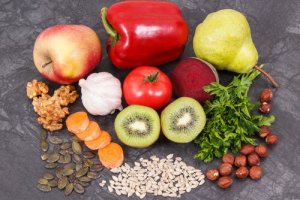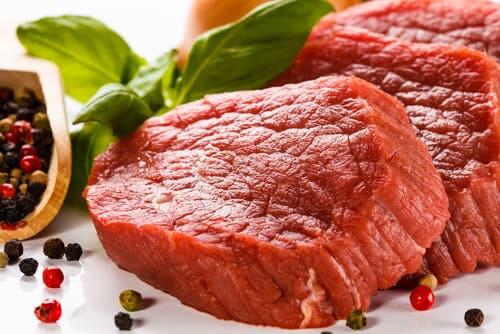Foods You Can't Eat if You Have High Uric Acid


Written and verified by the nutritionist Anna Vilarrasa
High uric acid or hyperuricemia has traditionally been related to people who love excesses, both in eating and drinking. Although we know that it depends on a variety of factors, diet change is important if you have high uric acid.
Hyperuricemia or high uric acid
Uric acid is a compound made up of carbon, nitrogen, oxygen, and hydrogen that’s created when your body breaks down purines. Purines form naturally in the body, and they’re also found in some foods.
Uric acid doesn’t cause health problems when you have normal levels, since it’s excreted by the kidney. However, sometimes, for various reasons, your uric acid levels can increase beyond acceptable levels.
When you have high uric acid, one of the most feared symptoms is gout. However, the negative consequences of hyperuricemia can be even more serious. It’s related to a higher risk of kidney and cardiovascular problems, and chronic arthritic damage.
Foods that have high uric acid
You should correct an excess of uric acid to avoid long term health problems and loss of quality of life. Changing a few dietary habits can be very beneficial.
If you suffer from this health problem, you should avoid some foods. Although you should keep in mind that we’re not talking about prohibited foods, just foods you should limit.
Purine rich foods

Purines are components that naturally form in the body. When they break down they turn into uric acid. Therefore, controlling your intake of high purine foods can help reduce the amount of uric acid in your blood. Especially during gout outbreaks.
The following are high purine foods:
- Liver, kidney, sweetbread, and other organs.
- Red meat from cows, sheep, and pigs.
- Fatty fish and seafood like sardines, anchovies, tuna, prawns, shrimp, and crab. You shouldn’t get rid of all of them, because then you’d be missing out on their benefits. But you should be eating moderate portions.
- Sausages.
- Very fermented cheeses.
- Some vegetables like asparagus, peas, spinach, and tomato are high in purines. A sensible option is to moderate your consumption of this type of vegetables to once or twice a week.
Fatty foods
It’s harder to eliminate urates when you eat a lot of fat. For this reason, you should control the fat in your diet if you have high uric acid.
The best option, as is almost always the case, is to use extra virgin olive oil. You can use it raw to dress your dishes, and also for cooking. It’s better to completely eliminate processed foods that can have trans or hydrogenated fats, and reduce your saturated fat intake.
Fructose and sugary drinks
Fructose is the only carbohydrate that has been shown to have a direct relation to metabolizing uric acid. In this case, we’re talking about sodas, fruit juice, and other sweetened drinks. The risk of gout is double in people that drink two or more sugary drinks a day, when compared to those who drink less than one per month.
However, we don’t know the exact reason for this increase in uric acid. It could be due to other ingredients in the drinks besides fructose, or because of other unhealthy habits.
Alcohol
In the case of alcoholic drinks, there’s no doubt. The risk of developing gout is more than double among men who drink 50 grams or more of alcohol per day, compared with those who don’t drink alcohol.
Both in men and women, alcohol consumption is related to higher rates of uricemia and gout. In fact, the risk is higher in women.
This is because consuming a lot of alcohol in a short time increases lactic acid concentration. This makes it hard for the kidney to eliminate uric acid. On the other hand, if you chronically drink alcohol, the problem comes from high levels of purines.

Discover more: Liver Metabolism: Antibiotics and Alcohol
Dietary steps to keep in mind
When we talk about hyperuricemia, we’re not just talking about foods you can’t eat. There are other dietary steps and related aspects you can change to improve your situation:
- It doesn’t help to have a weight higher than what is considered healthy. If you’re overweight, you should take measures for gradual weight loss.
- You shouldn’t fast or extremely restrict your calories, since this can also increase your levels.
- Stay hydrated. You should drink about 2 liters (8 cups) of water per day.
All of these steps should accompany your specific medical treatment laid out by a medical professional.
In summary
You should limit your consumption of red meat, fatty fish, sugary drinks, and alcohol, if you suffer from hyperuricemia. Eating in moderation, drinking a lot of water, and eating a diet full of fresh fruits and vegetables, whole grains, skim milk, and yogurt, will be a big help to combat this health problem.
All cited sources were thoroughly reviewed by our team to ensure their quality, reliability, currency, and validity. The bibliography of this article was considered reliable and of academic or scientific accuracy.
- Álvarez Larido B, Alonso Valdivielso JL. [Hyperuricemia and gout; the role of diet]. Nutrición Hospitalaria. Abril 2014. 1;29(4):760-70.
- Jamnik J, et al. Fructose intake and risk of gout and hyperuricemia: a systematic review and meta-analysis of prospective cohort studies. BMJ Open. Octubre 2016. 3;6 (10).
- Pemberton C, et al. Manual de dietética de la Clínica Mayo. Ediciones Medici. 1993.
- Rongrong L. et al. Dietary factors and risk of gout and hyperuricemia: a meta-analysis and systematic review. Asia Pacific Journal of clinical Nutrition . 2018;27(6). 1344-1356.
- Contreras Roura, Jiovanna. “Errores innatos del metabolismo de las purinas y otras enfermedades relacionadas.” Revista Cubana de Pediatría 84.2 (2012): 197-200.
This text is provided for informational purposes only and does not replace consultation with a professional. If in doubt, consult your specialist.








